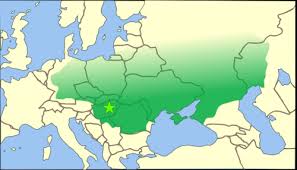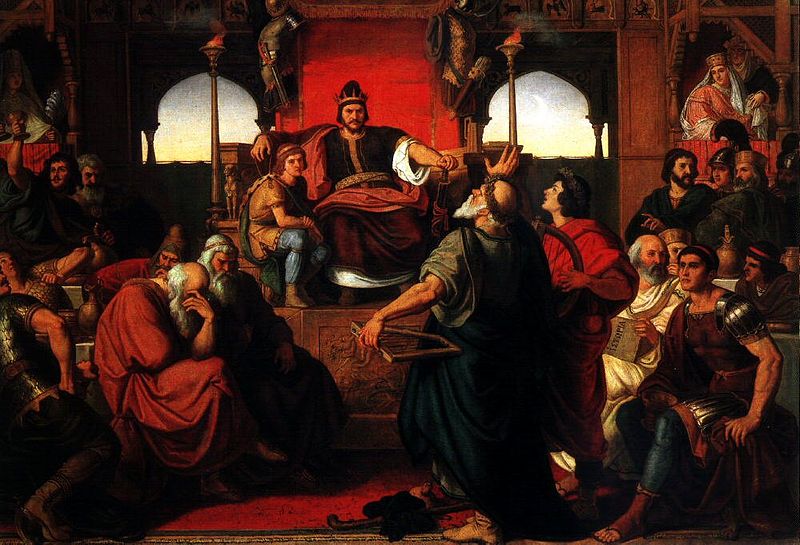Immortal Meals #17: Eating with Attila October 10, 2014
Author: Beach Combing | in : Ancient , trackbackFrom about 400 to about 1200 there are pitifully few western witness accounts: almost all experiences are filtered through poetry, hagiography, or legal documents. We don’t really see scenes or meet characters: there are names and there are gilded set pieces (a wedding, a miracle, a battle). This makes the exceptions so much more exciting… Now with this brief premise Let Beach take you to the Steppes of Asia in 449. The Western Roman Empire has all but fallen, the Eastern Empire is tottering and to the east there is one of the most terrifying men ever to come out of the rising sun, Attila the Hun, directing his warriors across the Danube to take cities, murder Romans and wrest gold from the imperium. In these desperate circumstances an Eastern Roman embassy, including the historian Priscus, is sent to parley with Attila and after a long and difficult journey into Hun territory (see map with star as capital) they finally come to Attila’s feasting hall where they are to sit within a knife’s throw of the scourge of God. Priscus’ description survives in fragments taken from his now lost work on the Huns The History of Byzantium and the Period of Attila and as an eyewitness he gives us a vivid and apparently honest account of the ill-fated Roman mission into the heart of darkness.

When we returned to our tent the father of Orestes came with an invitation from Attila for both of us to a banquet at three o’clock. When the hour arrived we went to the palace…, and stood on the threshold of the hall in the presence of Attila. The cup-bearers gave us a cup, according to the national custom, that we might pray before we sat down. Having tasted the cup, we proceeded to take our seats; all the chairs were ranged along the walls of the room on either side. Attila sat in the middle on a couch; a second couch was set behind him, and from it steps led up to his bed, which was covered with linen sheets and wrought coverlets for ornament, such as Greeks and Romans use to deck bridal beds. The places on the right of Attila were held chief in honour, those on the left, where we sat, were only second.
One of the endearing things about the Huns is they had (unlike most other barbarians) a complete disregard for Roman civilisation (though Roman coin interested them immensely) and the ambassadors were put firmly in their place; not least because the Eastern Emperor had been trying to arrange the murder of Attila. The Hun feast was, in fact, a surprisingly ordered affair with a series of toasts from the small to the great, that is to the glory of Attila: you would have had far more anarchy and fun among the couches of the Julian emperors in Rome three hundred years before. As to those toasts the Roman ambassadors had learnt from an earlier feast among the Huns where one of the Romans had made the almost unbelievable gaffe of comparing Attila the King to Valentinian the God… Now the Romans simply followed their hosts and and went through the motions of obsequiousness.
When this [toasting] ceremony was over the cup-bearers retired, and tables, large enough for three or four, or even more, to sit at, were placed next the table of Attila, so that each could take of the food on the dishes without leaving his seat. The attendant of Attila first entered with a dish full of meat, and behind him came the other attendants with bread and viands, which they laid on the tables. A luxurious meal, served on silver plate, had been made ready for us and the barbarian guests, but Attila ate nothing but meat on a wooden trencher. In everything else, too, he showed himself temperate; his cup was of wood, while to the guests were given goblets of gold and silver.
Attila knew all too well how to play the bucolic barbarian.
Next came the entertainment. First, there were songs glorying Attila’s deeds: the Huns cried or writhed with excitement. (This is the moment caught in the Hungarian painting heading this post, 1870 Mor Than). Afterwards, a Scythian court jester made the entire room laugh. Then, finally, Zerkon the Moorish dwarf amused the diners with ‘his dress, his voice, and his words, which were a confused jumble of Latin, Hunnic, and Gothic’. (Those long nomadic nights must have just flown by…). ‘Attila, however, remained immovable and of unchanging countenance nor by word or act did he betray anything approaching to a smile of merriment.’ Only his younger son excited any interest from the impaler: magicians had claimed that the boy would save his father’s empire. And women? Sexual promiscuity is often associated with Attila in popular culture: one memorable comic book description of a feast between the Romans and Attila, Attila Mon Amour, has Roman guests given oral sex between courses by Atilla’s ‘surplus’ wives. And there had, in fact, been some hints of hanky-panky in the journey east: Priscus and co had been presented with young women for the night when they came to a village in a thunder storm. But in a social setting the Huns were every bit as prudish as their Christian enemies.
Priscus and the Romans left early, tired of the endless toasting, insulted by the seating arrangements and ready for a tedious journey home. Still, Priscus would be able to tell for decades afterwards how, as a young man, he had sat in the same room with a continent conqueror and had lived to tell the tale.
Other immortal meals: drbeachcombing AT yahoo DOT com



